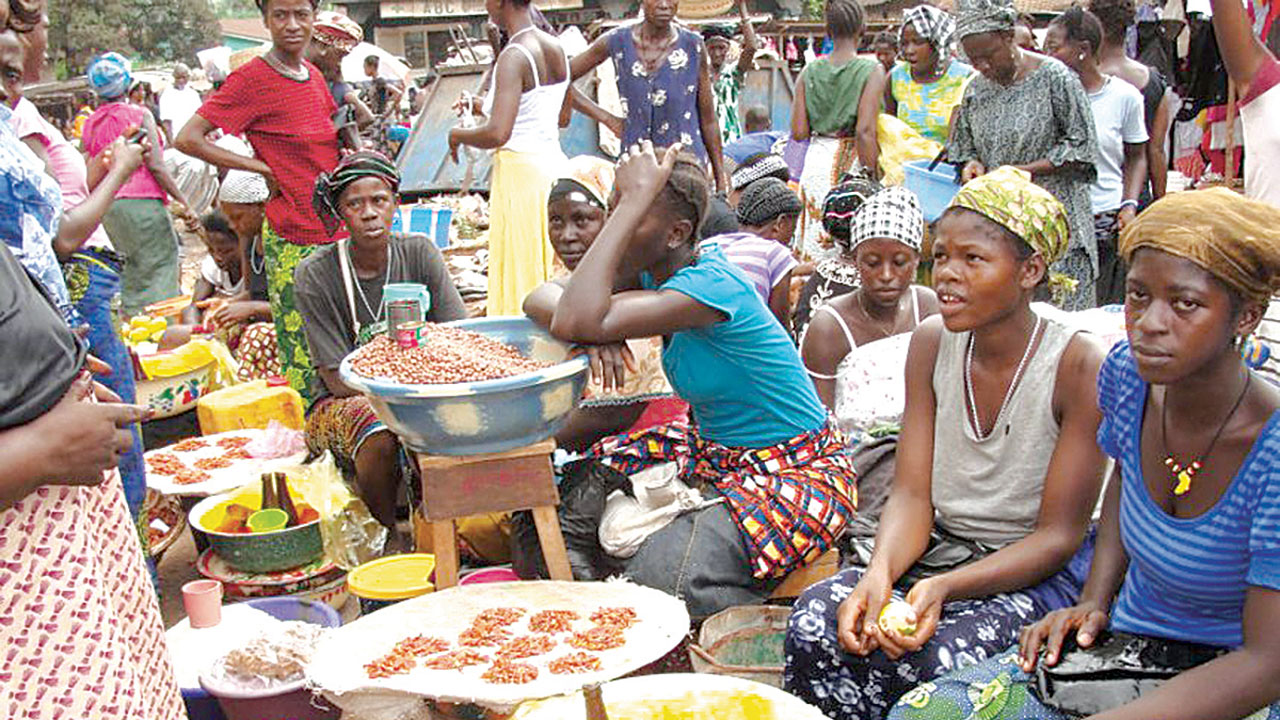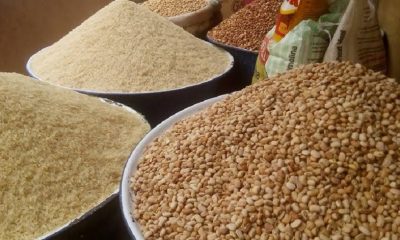Economy
Global Food Prices Jump 11th Consecutive Month in April

By Adedapo Adesanya
The prices of food commodity globally rose for the 11th consecutive month in April 2021, led by sugar, oil, and meat, the Food and Agriculture Organisation of the United Nations (FAO) has said.
The FAO said this in its Food Price Index report released on Thursday. The index tracks international prices of most commonly traded food commodities.
The FAO Food Price Index averaged 120.9 points in April, 1.7 per cent higher than March 2021 and 30.8 per cent higher than the same period of last year.
“The increase marked the 11th conservative monthly rise in the value of the FAO Food Price Index to its highest level since May 2014.
“And in nominal terms is 12 per cent below its all-time peak in February 2011,” it said.
The FAO Sugar Price Index increased 39 per cent from March and reached levels nearly 60 per cent above those registered in the corresponding month last year.
“The April rebound in international sugar price quotations was prompted by strong buying amid heightened concerns over tighter global supplies in 2020/21, due to the slow harvest progress in Brazil and frost damage in France.
“Further support was provided by the strengthening of the Brazilian Real against the US Dollar, which tends to affect shipments from Brazil, the world’s largest sugar exporter.
According to the report, the FAO Vegetable Oil Price Index averaged 162.0 points in April, up 1.8 per cent month-on-month, driven by rising soy, rapeseed and palm oil quotations more than offsetting lower sunflower oil values.
“International palm oil prices continued to rise in April on concerns over slower-than-expected production growth in major exporting countries.
“Soy and rapeseed oil values climbed further too, underpinned by respectively, firm global demand, including from biodiesel producers and protracted global supply tightness.
“By contrast, international prices of sunflower oil contracted moderately on-demand rationing,” it said.
In the report, the FAO Meat Price Index averaged 101.8 points in April, up 1.7 per cent from the slightly revised value for March, marking a seventh consecutive monthly increase and raising the index by 5.1 per cent above the corresponding month last year.
“In April, bovine and ovine meat quotations rose, underpinned by solid demand from East Asia, amidst tight supplies from Oceania due to ongoing herd rebuilding and low inventories.
“Elevated internal sales in some producing regions also supported bovine and ovine meat prices.
“Pig meat quotations firmed on continued high purchases by East Asia, despite increased overall shipments from the European Union, while Germany continued with no access to the Chinese market over African swine fever concerns.
“Meanwhile, poultry meat prices remained steady, reflecting generally balanced global markets,” the report said.
The report said the FAO Cereal Price Index averaged 125.1 points in April, up 1.2 per cent from March, resuming its climb after a short-lived one-month respite in March, and stood 26 per cent above its April 2020 level.
“Maize prices rose 5.7 per cent in April.
“With overall tightening maize supplies, on top of continued strong demand, maize prices stood 66.7 per cent above their values one year earlier and remain at their highest level since mid-2013.
“Among other coarse grains, international barley and sorghum prices continued to soften, falling 1.2 and 1.0 per cent in April but remained 26.8 and 86.5 per cent above their respective values in the corresponding month last year,” it said.
International wheat prices were generally steady in April, remaining over 17 per cent above their April 2020 values.
“By contrast, international rice prices decreased again in April, mainly reflecting currency movements and slow trading activities, with persistent logistical constraints and freight costs continuing to hinder fresh deals,” it said.
The report said the FAO Dairy Price Index averaged 118.9 points in April, up 1.2 per cent from March, rising for the eleventh consecutive month and lifting the index 24.1 per cent above its value a year ago.
“In April, butter quotations rose, underpinned by solid import demand from Asia, notwithstanding weaker internal demand in Europe.
“Skim milk powder prices increased due to high import demand from East Asia, induced partly by concerns over potential shipping delays amid limited spot supplies from Europe and Oceania.
“Cheese prices also increased due to high demand from Asia, amid lower-than-expected production in Europe and seasonally declining supplies from Oceania.
“By contrast, quotations for whole milk powder declined slightly, reflecting lower import demand for the available supplies, following significantly high volumes traded recently,” it said.
Economy
Seven Price Gainers Boost NASD OTC Bourse by 2.19%

By Adedapo Adesanya
Seven price gainers flipped recent declines at the NASD Over-the-Counter (OTC) Securities Exchange, raising the alternative stock market by 2.19 per cent on Friday.
According to data, the market capitalisation added N51.24 billion to end N2.389 trillion compared with the previous day’s N2.338 trillion, while the NASD Unlisted Security Index (NSI) climbed 85.65 points to close at 3,994.32 points, in contrast to the 3,908.67 points it ended a day earlier.
Business Post reports that the advancers were led by MRS Oil Plc, which improved its value by N13.00 to N200.00 per share from N187.00 per share, FrieslandCampina Wamco Nigeria Plc gained N7.40 to settle at N91.55 per unit versus the previous day’s N84.15 per unit, Central Securities Clearing System (CSCS) Plc appreciated by N6.08 to N71.00 per share from N64.92 per share, Afriland Properties Plc added 66 Kobo to finish at N17.17 per unit versus N16.51 per unit, IPWA Plc rose 37 Kobo to N4.15 per share from N3.78 per share, First Trust Mortgage Bank Plc grew by 11 Kobo to N1.20 per unit from N1.09 per unit, and Food Concepts Plc went up by 10obo to N3.70 per share from N3.60 per share.
On the flip side, there were two price losers led by Geo-Fluids Plc, which depreciated by 28 Kobo to N3.32 per unit from N3.60 per unit, and Industrial and General Insurance (IGI) Plc dropped 5 Kobo to sell at 45 Kobo per share from 50 Kobo per share.
Yesterday, the volume of trades went down by 92.0 per cent to 3.7 million units from 45.8 million units, the value of transactions fell by 59.4 per cent to N84.5 million from N208.2 million, while the number of deals went up by 7.7 per cent to 42 deals from 39 deals.
CSCS Plc remained the most traded stock by value (year-to-date) with 32.6 million units exchanged for N1.9 billion, trailed by Geo-Fluids Plc with 119.6 million units valued at N470.3 million, and Resourcery Plc with 1.05 billion units traded at N408.6 million.
Resourcery Plc closed the day as the most traded stock by volume (year-to-date) with 1.05 billion units sold for N408.7 million, followed by Geo-Fluids Plc with 119.6 million units worth N470.3 million, and CSCS Plc with 32.6 million units worth N1.9 billion.
Economy
FX Demand Worries Weaken Naira to N1,346/$1 at Official Market

By Adedapo Adesanya
The Naira weakened further against the United States Dollar in the Nigerian Autonomous Foreign Exchange Market (NAFEX) on Friday, February 20, by N4.97 or 0.37 per cent to N1,346.32/$1 from the N1,341.35/$1 it was transacted on Thursday.
Heightened FX demand tilted the market toward the downside yesterday, exerting upward pressure on rates despite efforts by the Central Bank of Nigeria (CBN) to stabilise the foreign exchange market.
Also in the official market, the domestic currency depreciated against the Pound Sterling during the session by N9.39 to sell for N1,815.25/£1 versus the previous day’s N1,805.86/£1, and lost N7.33 against the Euro to close at N1,584.62/€1 compared with the preceding session’s N1,577.29/€1.
The story was not different for the Nigerian Naira at the GTBank FX desk, where it depleted against the Dollar by N7 on Friday to quote at N1,356/$1 versus the N1,349/$1 it was sold a day earlier, but remained unchanged in the black market at N1,370/$1.
It was observed that risky sentiment among Foreign Portfolio Investors (FPIs) contributed to the FX market, amid fears of hot money flight due to capital gains tax and other factors.
As for the cryptocurrency market, it was mostly green yesterday in reaction to a Supreme Court verdict dismissing a fresh 10 per cent global levy by President Donald Trump.
The apex court on Friday described Mr Trump’s global tariff rollout as illegal. The decision did not clarify what should happen to tariff revenue already collected, and it doesn’t necessarily spell the end of the trade agenda, with multiple legal and executive avenues still available.
Litecoin (LTC) grew 2.7 per cent to $55.00, Cardano (ADA) appreciated 2.6 per cent to trade at $0.2815, Binance Coin (BNB) expanded by 2.6 per cent to $627.19, Dogecoin (DOGE) recouped 1.3 per cent to quote at $0.1, Ripple (XRP) jumped 0.7 per cent to $1.43, Solana (SOL) improved by 0.5 per cent to $84.15, and Ethereum (ETH) soared 0.1 per cent to $1,962.78.
However, Bitcoin (BTC) lost 0.2 per cent to sell for $67,850.49, while the US Dollar Tether (USDT) and the US Dollar Coin (USDC) traded flat at $1.00 each.
Economy
Fidson, Jaiz Bank, Others Keep NGX in Green Territory

By Dipo Olowookere
A further 0.99 per cent was gained by the Nigerian Exchange (NGX) Limited on Friday after a positive market breadth index supported by 53 price gainers, which outweighed 23 price losers, representing bullish investor sentiment.
During the trading day, the trio of Jaiz Bank, Fidson, and NPF Microfinance Bank chalked up 10.00 per cent each to sell for N11.00, N86.90, and N6.27, respectively, while Deap Capital appreciated by 9.96 per cent to N7.62, and Mutual Benefits increased by 9.94 per cent to N5.42.
Conversely, Secure Electronic Technology shed 10.00 per cent to trade at N1.62, Sovereign Trust Insurance slipped by 9.73 per cent to N2.32, Ellah Lakes declined by 7.91 per cent to N12.80, International Energy Insurance retreated by 5.56 per cent to N3.40, and ABC Transport moderated by 5.26 per cent to N9.00.
Data from Customs Street revealed that the insurance counter was up by 2.52 per cent, the industrial goods sector grew by 2.28 per cent, the banking space expanded by 1.43 per cent, the consumer goods index gained 1.23 per cent, and the energy industry rose by 0.05 per cent.
As a result, the All-Share Index (ASI) went up by 1,916.20 points to 194,989.77 points from 193,073.57 points, and the market capitalisation moved up by N1.230 trillion to N125.164 trillion from Thursday’s N123.934 trillion.
Yesterday, investors traded 820.5 million stocks valued at N28.3 billion in 63,507 deals compared with the 898.5 million stocks worth N38.5 billion executed in 61,953 deals, showing a jump in the number of deals by 2.51 per cent, and a shortfall in the trading volume and value by 8.68 per cent and 26.49 per cent apiece.
Closing the session as the most active equity was Mutual Benefits with 79.0 million units worth N427.1 million, Zenith Bank traded 44.0 million units valued at N3.8 billion, Chams exchanged 43.9 million units for N182.0 million, AIICO Insurance transacted 42.4 million units valued at N179.8 million, and Veritas Kapital sold 36.0 million units worth N90.6 million.
-

 Feature/OPED6 years ago
Feature/OPED6 years agoDavos was Different this year
-
Travel/Tourism10 years ago
Lagos Seals Western Lodge Hotel In Ikorodu
-

 Showbiz3 years ago
Showbiz3 years agoEstranged Lover Releases Videos of Empress Njamah Bathing
-

 Banking8 years ago
Banking8 years agoSort Codes of GTBank Branches in Nigeria
-

 Economy3 years ago
Economy3 years agoSubsidy Removal: CNG at N130 Per Litre Cheaper Than Petrol—IPMAN
-

 Banking3 years ago
Banking3 years agoSort Codes of UBA Branches in Nigeria
-

 Banking3 years ago
Banking3 years agoFirst Bank Announces Planned Downtime
-

 Sports3 years ago
Sports3 years agoHighest Paid Nigerian Footballer – How Much Do Nigerian Footballers Earn




















